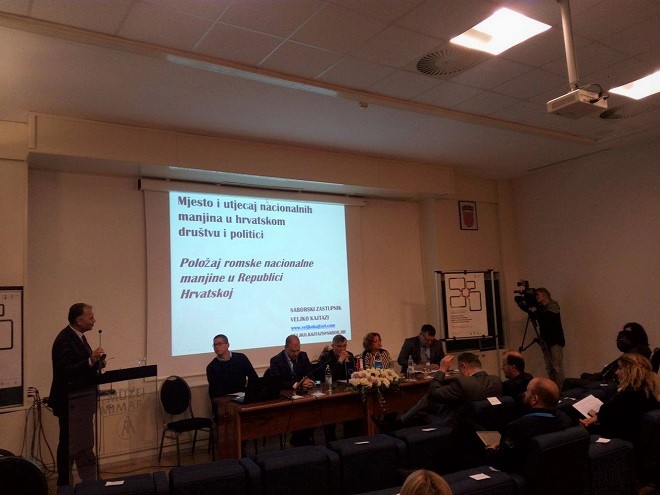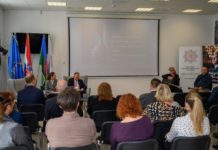Interdisciplinary Expert Scientific Conference on “Intercultural and Interreligious Dialogue: Croatian Positive Experience in the European Context” was held in the Mimara Museum on 21st November 2017. The Conference was organized by the Ministry of Culture of the Republic of Croatia and the Croatian Commission for UNESCO under the auspices of the Government of the Republic of Croatia.
The Conference was divided into three sessions: Importance of intercultural and interreligious dialogue in a globalized world, Sociological and legal challenges of multiculturalism, and Coexistence, dialogue and cooperation in Croatian society. Lecturers at the first session were: Tomislav Kovač, Head of Department of Fundamental Theology at the Catholic Faculty of Theology at the University of Zagreb, Academician Ivan Supičić on behalf of the Croatian Academy of Sciences and Arts, Željko Tanjić, Rector of the Catholic University of Croatia, Igor Kitaev on behalf of the UNESCO Regional Bureau for Science and Culture in Europe; at the second session the lecturers were: Roger Koussetogue Koude, lecturer and researcher at the Human Rights Institute of Lyon, Vice-Dean of the Faculty of Law, Economics and Social Sciences and the Head of the UNESCO Department for “Memories, Culture and Interculturality” at the Lyon Catholic University, Gordan Črpić, Vice-Rector for Organization and Financial Affairs of the Catholic University of Croatia and, Tijana Vukojičić Tomić on behalf of the Faculty of Law, University of Zagreb and Vedran Đulabić, who is also the Secretary of the Evangelical Pentecostal Church of Croatia.
The third session was opened by MP Veljko Kajtazi with the topic on Status of National Minorities, especially the Roma National Minority in the Republic of Croatia. Beside the constitutional-legal status of national minorities, Kajtazi also referred to other important strategic documents regulating the position of national minorities and their institutions and other bodies (Councils and Associations). In addition, the lecturer also mentioned three Romani holidays organized by the Croatian Romani Union “KALI SARA”.
“The problem of Roma has been recognized by the European Union and that is why the members of the Roma community have several strategic documents, they have a National Strategy and until recently the National Program and that is somehow – detecting the very problems. When it comes to solving those problems – very little has been done, almost nothing”, added Kajtazi.

“It is not just a phrase or a platitude when we say that, despite the fraught history, the coexistence of many different and strong identities is possible, although it is not always easy and should not be accessed naively and implicitly,” added Dan Đaković from the Sector for Promotion of Human Rights, Civil Society and National Minorities at the Office of the Mayor of the City of Zagreb.
The same session was also attended by Željko Mraz, President of the Association for Religious Freedom in the Republic of Croatia and Secretary General of the Baptist Union of Croatia and Jasminka Domaš, journalist, writer, spokesperson and member of the Jewish Community Bet Israel of Croatia. Daniela Draštata and Dalibor Matić reflected on representation of national religious minorities on Croatian Radiotelevision and Croatia’s contribution to international development and humanitarian politics, while Tvrtko Barun spoke about the legal status and integration of refugees in Croatia and Mufti Aziz effendi Hasanović, President of Meshihat of Islamic Community in Croatia on the coexistence of Muslims in Croatia as a model example of the European reality.
“Which models of organizing Muslims we see in Europe today? Firstly, we have ghettoized groups whose isolation is a big problem. The principle of their closed life is completely opposed to all European values, and such communities can pose a certain problem, for example a security one, as a consequence of manipulation and misuse being subjected to the limitation of information and the consequences of closeness. The second model we encounter with a certain number of Muslim communities is full assimilation in the society they came to. They are brought up on the principles of inferiority complex when certain frustrations arise, which lead to negative expression and resorting to some unwanted acts or moves, which again represents a problem itself. They are constantly imposing them the feeling that their faith is culpable of all, the source of all evil, and they are often urged to renounce it. They do not accept such an approach and in the name of “protecting their faith”, assisted by external factors, they engage themselves in terrorist actions. What is worst of all is that they invoke Islam and thus inflict the greatest damage to Islam and Muslims. Qur’an says that whoever kills an innocent person it is as though he has killed all mankind and whoever saves a life should be considered as the saviour of whole mankind. Knowing this fundamental principle of Islam, we wonder who can then be the murderer of innocent people, children and women. A Muslim cannot sow such a disorder on our planet. The third model is a model of integration where the fullness of identity has been inherited. Identity implies and includes faith, nation, culture, language, customs, and the like. We, Muslims in Croatia, have accepted this third model, which is the model of integration. We develop it through our religious community, through cultural and national societies, “emphasized Mufti Aziz effendi Hasanović, President of Meshihat of Islamic Community in Croatia.
Expert Scientific Conference is partially complementary to the International Conference Mawaïd – Rendez-Vous for the Euro-Arab Dialogue, held in Paris from 9 to 10 December 2016, organized by UNESCO and the MBI Al Jaber Foundation from Oman. The aim of this conference was to enhance the dialogue between Europe and the Arab-Muslim world in order to contribute to the encounter of cultures and civilizations and to build peace in today’s world, which is especially important in the present marked by the rise of various forms of extremism, exclusivity and violence.
The main aim of the Interdisciplinary Expert Scientific Conference on “Intercultural and Interreligious Dialogue: Croatian Positive Experience in the European Context” was to evaluate cultural and religious diversity as an integral part of Croatian society, to awaken it to the citizens of Croatia and to show it as a stimulating example to the community of European peoples and the wider world.












